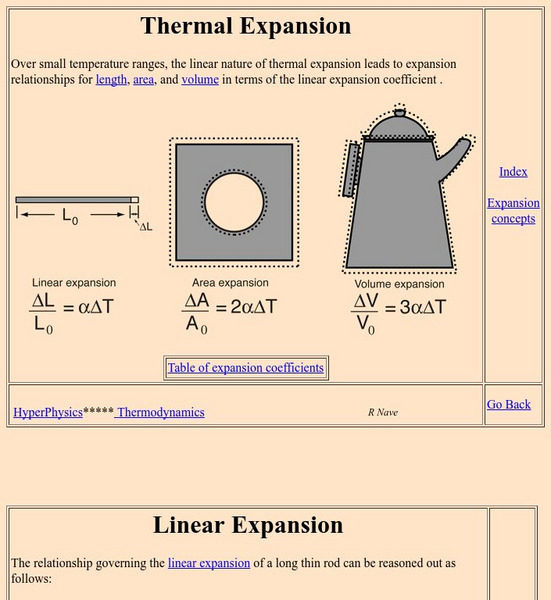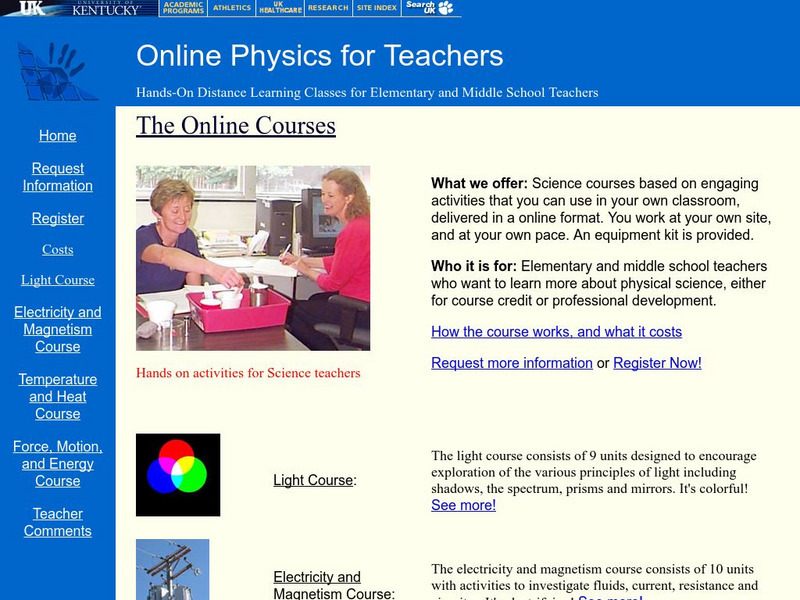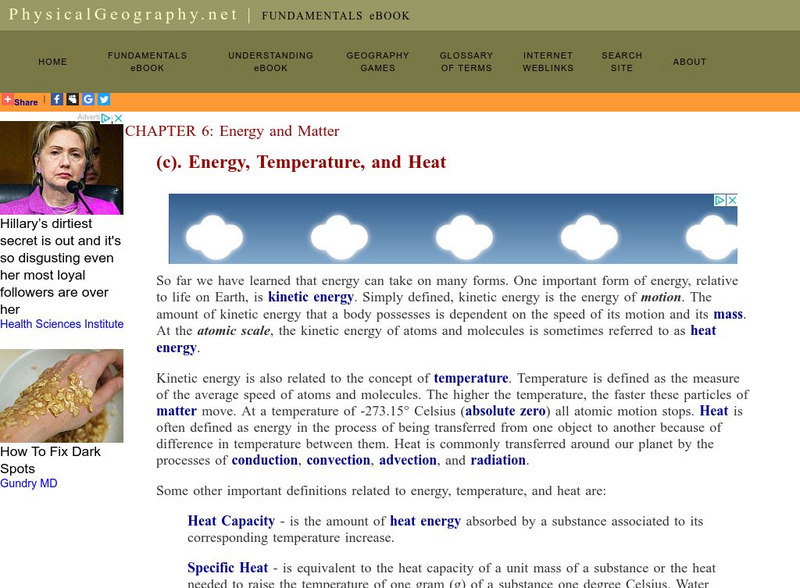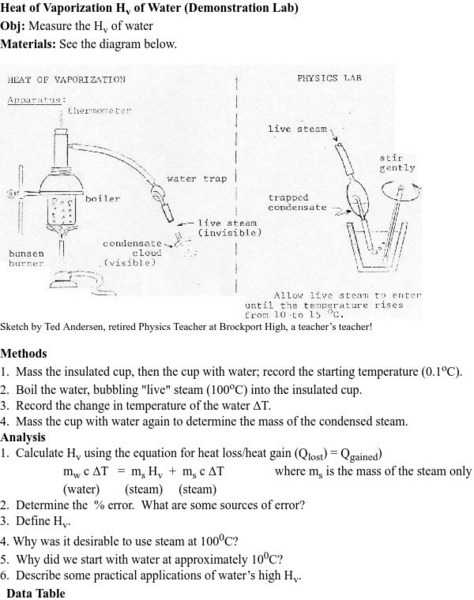Concord Consortium
Concord Consortium: Stem Resources: Heat and Light From Electricity
Understand the energy transformations that happens when you light a bulb with a battery. Activity requires students to build a simple circuit and take temperature and time measurements. Lab includes procedure with questions that can be...
Physics Aviary
Physics Aviary: Practice Problems: Power From Temperature Data
This program asks students to determine the effective power of an appliance based on the temperature of the sample after different intervals of time. The appliance was not activated at time equals zero and students must determine the...
Physics Aviary
Physics Aviary: Ideal Engine Lab
This lab is designed to have students examine how the temperature of the heat source and the temperature of the coolant effect the efficiency of the ideal engine.
Physics Classroom
The Physics Classroom: Thermal Physics: Measuring the Quantity of Heat
Through interactive exercises and illustrated example problems, students learn about specific heat capacity and measuring the quantity of heat.
Physics Classroom
The Physics Classroom: Thermal Physics: Rates of Heat Transfer
Through illustrated examples and interactive examples, students investigate the topic of the rate of heat transfer.
Physics Aviary
Physics Aviary: Practice Problems: Specific Heat of a Fluid
This program asks students to determine the specific heat of a fluid based on the amount of temperature change that occurs when a hot object is placed in the fluid.
Physics Aviary
Physics Aviary: Guided Specific Heat Lab
This lab is designed to have students learn how to calculate the specific heat of a liquid based on the temperature changes that occur when hot water is added to the liquid.
Physics Aviary
Physics Aviary: Guided Specific Heat of Solid Lab
This lab is designed to have students learn how to calculate the specific heat of a solid based on the temperature changes that occur when a hot solid is added to cold water.
CK-12 Foundation
Ck 12: Chemistry Simulation: Camping Chemical and Physical Changes
[Free Registration/Login Required] Explore how heat and temperature relate to phase changes.
Georgia State University
Georgia State University: Hyper Physics: Thermal Expansion
Defines thermal expansion and elaborates on the concept of linear expansion. Provides the equation for linear expansion and includes an interactive JavaScript form which allows the visitor to investigate the relationship between...
Georgia State University
Georgia State University: Hyper Physics: Radiation Cooling of Body
Discusses the means by which the body regulates its temperature. The role of radiation in this process is explained. An equation for calculating the rate at which energy is transferred by radiation is presented. Also, an interactive...
Georgia State University
Georgia State University: Hyper Physics: Temperature Regulation of the Human Body
Discusses the methods the human body uses to regulate body temperature. Includes links to the four external heat transfer mechanisms (radiation, conduction, convection, and evaporation of perspiration).
Georgia State University
Georgia State University: Hyper Physics: Law Concepts
This site from Georgia State University Department of Physics and Astronomy is an indexing page for the HyperPhysics site. The page links to a variety of other pages which discuss concepts related to entropy and the second law of...
Georgia State University
Georgia State University: Hyper Physics: Expansion Concepts
An indexing page from Georgia State University Physics Department which includes links to various other pages with information pertaining to thermal expansion. From expansion coefficients to equations to calculation and practice pages,...
University of Sydney (Australia)
Thermal Physics Module: Thermal Expansion [Pdf]
A lengthy set of lecture notes on the topics of thermal expansion and heat absorption. The concept of specific heat capacity is explained and numerical examples are discussed. Heats of transformation (fusion, vaporization) are explained...
University of Sydney (Australia)
Thermal Physics Module: Refrigerators and Heat Pumps [Pdf]
Refrigerators and heat pumps are described. Their operation is explained and the variables which improve their efficiency is discussed.
University of Sydney (Australia)
Thermal Physics Module: Heat Engines [Pdf]
The second law of thermodynamics and the concept of entropy is applied to the topic of heat engines. The Carnot and Stirling engine are discussed. Efficiency is explained and an equation is derived.
Other
Earth Science: Earth's Surface and Heat [Pdf]
This textbook chapter looks at the role of temperature in sustaining life on Earth and on weather and climate. It discusses the Earth's movements and the seasons, the circulation of the oceans, wind and weather, and the water cycle....
University of Kentucky
University of Kentucky: Online Physics for Teachers
A set of four online courses in Physics for elementary and middle school teachers. Each course targets a different topic area - light, electricity & magnetism, temperature & heat, and force, motion, & energy.
Other
Fund. Of Phys. Geography/energy, Temperature, and Heat
A page describing (in part) the distinction between energy, temperature and heat. Includes a graphic illustrating the quantity of energy needed to transform water between various states. Methods of thermal energy transfer (convection,...
Other
Physics Labs/specific Heat (C) of Metal
A complete set of directions, notes, and suggestions for a lab involving the determination of the specific heat values for various metals. Suitable for a student project or lab investigation.
Other
Physics Labs: Heat of Fusion (Hf) of Ice
A complete set of directions, notes and suggestions for a lab involving the determination of the heat of fusion of ice. Suitable for a student project or lab investigation.
Other
Physics Labs/heat of Vaporization (Hv) of Water
A complete set of directions, notes and suggestions for a demonstration involving the determination of the heat of vaporization of water. Suitable for a student project or lab investigation.
Physics Central
Physics Central: Physics in Your Glass: Racing Molecules
An easy experiment for demonstrating and exploring molecule movement requiring common household items: two glasses, two dark colors of food coloring, and warm and cold water. A few variations to the experiment will have students using...














